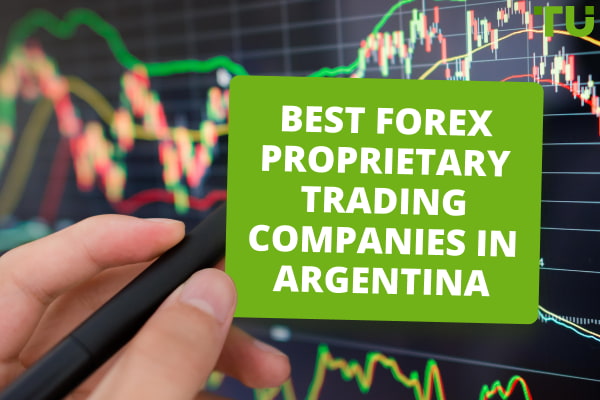Best Forex Proprietary Trading Companies in South Africa

The best prop trading firm in the United States is Topstep
Top prop trading firms in South Africa are:
-
1
Topstep - for unlimited time for prop traders to hit their profit targets
-
2
Fidelcrest - for fast-track qualification
-
3
5%ers - for quick account scaling
-
4
SurgeTrader - for traders of all skill levels
-
5
FTMO - for the best profit splits in the industry.
Forex trading is among the various ways some skilled South Africans have been able to gain financial freedom. Today, individuals with exceptional trading skills who do not have the funds to trade can benefit from forex prop firms in South Africa. These Forex prop firms equip experienced traders in South Africa with considerable capital to trade in their markets of expertise.
So if you're an experienced Forex trader in South Africa, this article will be of great value. It entails the best Forex prop firms you should consider if you want to be among those earning big as Forex prop traders.
What are the best Forex proprietary trading companies in South Africa?
Is Forex prop trading a good idea in South Africa?
Forex prop trading involves an experienced trader and a dedicated platform recognized as a Forex proprietary trading firm. Not all savvy traders in South Africa can afford to fund their trading accounts with more than $100,000, but a prop firm with plenty of resources can easily. The forex prop firms provide the trading funds, while the prop trader uses the best trading strategy to double the investment.
Prop trading firms give traders access to a decently funded account to trade. They take great care to identify people who can maintain consistent profitability in the market. And provide traders with leverage based on the risk capital deposited and the firm’s policies.
In South Africa, this style of trading is a good idea, even though it requires the prop trader to be mindful of the forex prop firms. While South Africa is among the nations with a sizable Forex trading industry, it is crucial to be cautious when engaging in prop trading. Therefore, the prop trader needs to do some research on South African Forex prop firms.
In a nutshell, Forex prop trading in South Africa has more advantages than disadvantages, which is why it is a top passive income option. Here are the top benefits and drawbacks of Forex prop trading in South Africa.
👍 Pros
•Leverage is the main perk of a proprietary trader. Theoretically, higher leverage should result in higher potential returns.
•Prop traders typically offer per-share fees that decline as trading volume rises and are more reasonably priced than retail brokers.
•Prop firms take significant positions in the market and allow traders to use leverage thanks to their enormous account balances.
•A lower commission structure is ensured by forex prop trading because high volume results in much lower commissions for prop traders.
•Greater leverage is guaranteed when trading forex prop with prop firms, which increases the potential returns.
•The trader and the company both profit from proprietary trading.
•Another benefit of proprietary trading is that a company can keep an inventory of securities for potential future use. Additionally, clients who want to sell securities short can borrow the securities.
•Prop trading entails zero risk because you only need to demonstrate your ability during the evaluation period to receive funding.
•Prop Firms are using their skills to assist traders in landing their ideal positions.
•Trading with hundreds of thousands of dollars is made possible for experienced traders through forex prop trading.
👎 Cons
•It is not a task that any trader can easily qualify for, and there are stringent rules governing the procedures.
•For the platform and account access, many prop firms charge fees. The trader makes an initial deposit, which serves as the firm's risk "buffer." If your first trade doesn't turn a profit, you risk losing your initial investment.
•Trading another person's money can be intoxicating. A trader may become better as a result of these factors, but the quality of life may also decline.
•If you fail the test set by the prop firm, you risk losing your job as a prop trader sooner.
•Although it is typically offered at no cost to day traders, some prop firms may also charge a desk or software fee.
•The business will probably keep some of its profits when trading with prop accounts.
Top 5 prop trading accounts for South Africans
1 Topstep Forex
Topstep is an international proprietary trading company registered in the USA. The company has been providing financial services since 2012 and offers exclusive trading terms for clients from different countries. Topstep provides financing of real trading accounts of its clients if they prove the skill to make trades and manage risks on a simulation account. Traders can trade CME Group futures and currency pairs. Trading on real accounts is carried out through the ECN broker Equiti Capital.
2 Fidelcrest
Fidelcrest offers 13 accounts to suit different types of traders, providing access to more than 1,000 financial instruments. Known for its robust training programs and exceptional support services, the prop firm offers profit splits of up to 90%.
There are two main accounts available at Fidelcrest, Micro Trader and Pro Trader, both of which offer Normal and Aggressive settings. Each risk type is funded at three different levels.
Depending on the risk type, the Micro account has funding between $25,000 and $50,000. A difference between the two lies in the profit targets, the minimum number of trading days, and the maximum loss limits. Micro Trader, for example, has a maximum overall loss limit of 10% and a profit target of 5%. There is a maximum loss of 20% with Aggressive risk, and a maximum profit target of 15%.
Currently, ProTrader accounts are funded between $150,000 and $1 million, of which $1 million is only available for Normal Risk accounts. Both accounts can be leveraged up to 1:100.
Each account type is evaluated in two steps, depending on the minimum number of trading days, maximum daily loss limit, and maximum overall loss limit. The KYC program at Fidelcrest requires that you submit documents in addition to meeting the trading parameters.
The fees for different types of accounts and risk levels vary. It costs between $104 and $474 to open a Micro Normal risk account. The prices for Micro Aggressive accounts range from $157 to $579, while those for ProTrader accounts range from $685 to $2,848.
How does Fidelcrest Challenge Work?3 5%ers
The 5%ers are known for their unique ways of handling forex funded accounts. These methods may be beneficial to traders who would like to try something different.
The 5%ers take a completely different path from the other apps on this list. Each funded trading account is a live, real-money funded trading account funded by The5ers and tradeable by subscribers.
All forex majors such as EUR/USD, USD/CHF, and key cross-currency pairs such as AUD/CAD and GBP/JPY are tradable assets. Each trader must complete the Level 1 Program with a profit target ranging from 10% to 25%.
The Level 1 Program will be closed once the profit target has been archived by trading according to the guidelines. Profit will be distributed in accordance with the profit split, and a new trading account on the next higher financing level will be established with you as a Portfolio Manager Partner. The entry cost ranges from $275 to $875. The 5%ers offer a 50/50 split on profits.
4 SurgeTrader
SurgeTrader offers 75% profit splits to funded traders who meet their trading criteria. It's the perfect prop firm to diversify your investment portfolio with a variety of tradeable assets.
SurgeTrader has only one phase of evaluation, unlike many other prop firm trading entities. Traders of all skill levels can choose from six packages. With its Starter Package, you get $25,000 in instant funding and a 10% profit target. There’s a maximum trailing drawdown of 5%. The Starter Package is ideal for beginners who want to avoid aggressive accounts.
With a $1 million funding size and 75% profit split, the Master Package is the highest-tier account. A 10% target is set, along with a four-percent daily loss limit and a five-percent maximum trailing drawdown. If you have a lot of confidence in your abilities, this package may be for you.
Additionally, this prop firm offers a wide variety of tradable securities, including crypto and gold, as well as popular stock indices. It’s possible to leverage up to 1:10.
A top proprietary trading firm, SurgeTrader requires all of its clients to undergo evaluations. You need to pass only one phase of the SurgeTrader Audition process. It’s not necessary to earn over 10% of your account balance in order to pass the audition.
Audition fees range from $200 to $6,500 per account. There’s no limit to how many times you can take the audition. You can use credit/debit cards and PayPal to make payments and withdrawals.
Is Surge Trader safe?5 FTMO
To qualify for a funded trading account at FTMO, you must go through a rigorous three-step process:
Enter the FTMO Challenge, where you must meet the profit targets within 30 days.
Begin the 60-day Verification Procedure, during which you must demonstrate that you can repeat your FTMO Challenge success.
After completing the two-step review procedure with the FTMO Challenge and Verification, you will be contacted by FTMO with an offer to trade their capital on accounts ranging from $10,000 to $400,000.
A great fact to note is that FTMO’s stronghold is its currencies. This is the best place to consider a forex funded account, if you enjoy trading currencies. You can trade 44 currency pairs as well as 10 cryptocurrencies. Furthermore, cash indices, commodities, and stock CFDs are available for trading.
The free versions of the three most popular forex trading platforms, MetaTrader 4, MetaTrader 5, and cTrader, are accessible.
The fee is paid once per FTMO Challenge. While the funded account currency might be USD, GBP, EUR, CZK, CAD, AUD, or CHF, the challenge fee is exclusively charged in Euro. The participation price for the 10k account begins at 155 EUR. The 25k is 250 EUR, the 50k is 345 EUR, the 100k is 540 EUR, and the 200k is 1,080 EUR. Traders receive capital ranging from $10,000 to $400,000 and an 80/20 split on profits. Whatever the profit a trader earns on the capital given, they will receive 80% of it.
In addition to that, there is a Scaling Plan for funded accounts that allows traders to enhance the Profit Split in their favor up to 90:10 with account sizes up to $2,000,000.
Are international prop trading firms legit in South Africa?
While international prop trading firms operate without restrictions in South Africa, it is important to research these platforms' legal compliance. It is recommended to carry out a thorough investigation of any international prop trading firms. Review forums and websites like Trust Pilot are good places to find information about these proprietary forex trading firms.
International trading platforms include South Africa on their list of countries with which they permit traders to conduct transactions. Prop firms with a South African base must obtain permission to operate from the Financial Sector Conduct Authority (FSCA), the country's regulatory body. Hence, this regulatory authority ensures that brokers do not violate trading and some financial regulations.
So when you choose an international prop firm or forex prop firm in South Africa, a firm that is regulated signals legitimacy to forex traders.
How to withdraw money from a prop trading account
The goal of forex prop companies in South Africa is to give traders lacking trading capital a chance to trade. Furthermore, traders who are successful and make a profit while using the capital without incurring any liability are compensated as a percentage of their earnings. And a prop trader might need to adhere to the payout procedures outlined by the forex prop firms in order to withdraw these profits. Here is how to withdraw money from a prop trading account, although this varies widely among forex proprietary trading firms.
Ensure that your accumulated profit is up to the amount the prop firm account stipulates for withdrawal.
On the prop firm account dashboard, click on withdrawals.
To determine how much you will be withdrawing, check the split percentage. Many prop firms offer prop traders the highest payout at an 80:20 split!
Enter the amount you want to withdraw.
Your profit will be posted to an account if approved, and you can withdraw it using your preferred method. Profits can be taken out of some prop firms using bank wires, PayPal, ACH transfers, and cryptocurrencies.
Note: Traders with at least 1% profit in their account are eligible to request payouts every 14 or 30 days. After each payout, their account resets, and they must wait another 14 days before making another payout request.
How to choose a prop trading account in South Africa
Choosing a specific Forex prop firm in South Africa can be challenging due to the tantalizing offers and benefits made by many of these firms. This is why you need to become familiar with the different criteria for selecting a prop trading account in South Africa. Here are factors to consider when choosing a Forex prop firm in South Africa.
License: To begin, confirm that the Forex proprietary trading firms are legitimately permitted to engage in Forex trading. Then check if the platform can operate in South Africa.
Reliability: Make findings on the prop firm's reputation, which is obtainable by checking review forums or sites like Trustpilot.
Trading protocols: Ensure you learn about the platform's trading protocols and restrictions to ensure it suits your trading style.
Extra services: Check for each prop firm's available markets and leverage, customer support, and daily and overall drawdown limits.
Account fees: Learn about the sign-up costs for the prop firm. Sign up for an account and fund it just like you would with a typical trading account if your trading requirements match those of any of the Forex prop firms.
Expert Opinion
Prop trading can definitely be lucrative if you have strong trading skills. But it's important to understand that these firms are still businesses. Their goal is to make money, so know that the odds are stacked against you to a degree. Most traders will not pass the challenge period and will not earn funded status. It's an inherently risky endeavor.
That said, for those willing to put in the work to develop their ability, prop trading can open doors to opportunities you may not otherwise have. Just go into it with your eyes wide open. Treat the challenge periods seriously - have a well-backtested strategy and stick to your plan, maintaining solid risk management.
Don't get too focused on potential earnings - the real goal is skills development. Treat the funded account as a learning opportunity more than a money-making venture. Developing discipline and refining your strategy should take priority over short-term performance targets.
Start with a smaller, less pressure-filled account. Jumping straight to a large funded account before proving yourself can lead to mistakes born from inexperience or fear of losing the opportunity. Take your time to gradually scale up.
Communicate regularly with your account manager. Ask questions, discuss market views, and get candid feedback on your trading. A good relationship with oversight can help catch problems early and maximize your learning.
FAQ
Is prop trading in South Africa free?
There is a subscription fee when enrolling, even though an experienced trader can make money trading for a Forex prop firm in South Africa. This means that trading in South Africa is not free.
What are the best forex prop firms in South Africa?
The best forex prop firms in South Africa include FTMO, Topstep, My Forex Funds, City Traders Imperium, E8, and Uprofit.
Is prop trading legit in South Africa?
When you trade with a broker authorized by the Financial Sector Conduct Authority (FSCA) or other top regulators, prop trading is legitimate in South Africa.
Do prop traders make a lot of money?
Depending on the traders' experience and the perks offered by the prop firm, prop traders make a lot of money.
How do I become a prop trader?
Because prop traders are individuals who are knowledgeable about the capital market and have a keen eye for lucrative opportunities, you need to have a bachelor's degree in finance, business, or mathematics. Also, ensure you are familiar with the various trading strategies and risk management techniques used in Forex and can control your emotions when things don't go your way. Then, strive to pass the Securities Trader Representative Exam (Series 57) and Securities Industry Essentials (SIE) to become a licensed prop trader.
Methodology for compiling our ratings of prop firms
Traders Union applies a rigorous methodology to evaluate prop companies using over 100 quantitative and qualitative criteria. Multiple parameters are given individual scores that feed into an overall rating.
Key aspects of the assessment include:
Trader Testimonials and Reviews. Collecting and analyzing feedback from existing and past traders to understand their experiences with the firm.
Trading instruments. Companies are evaluated on the range of assets offered, as well as the breadth and depth of available markets.
Challenges and Evaluation Process. Analyzing the firm's challenge system, account types, evaluation criteria, and the process for granting funding.
Profit Split. Reviewing the profit split structure and terms, scaling plans, and how the firm handles profit distributions.
Trading Conditions. Examining leverage, execution speeds, commissions, and other trading costs associated with the firm.
Platform and Technology. Assessing the firm's proprietary trading platform or third-party platforms it supports, including ease of use, functionality, and stability.
Education and Support. Quality and availability of training materials, webinars, and one-on-one coaching.
Team that worked on the article
Peter Emmanuel Chijioke is a professional personal finance, Forex, crypto, blockchain, NFT, and Web3 writer and a contributor to the Traders Union website. As a computer science graduate with a robust background in programming, machine learning, and blockchain technology, he possesses a comprehensive understanding of software, technologies, cryptocurrency, and Forex trading.
Having skills in blockchain technology and over 7 years of experience in crafting technical articles on trading, software, and personal finance, he brings a unique blend of theoretical knowledge and practical expertise to the table. His skill set encompasses a diverse range of personal finance technologies and industries, making him a valuable asset to any team or project focused on innovative solutions, personal finance, and investing technologies.
Dr. BJ Johnson is a PhD in English Language and an editor with over 15 years of experience. He earned his degree in English Language in the U.S and the UK. In 2020, Dr. Johnson joined the Traders Union team. Since then, he has created over 100 exclusive articles and edited over 300 articles of other authors.
Mirjan Hipolito is a journalist and news editor at Traders Union. She is an expert crypto writer with five years of experience in the financial markets. Her specialties are daily market news, price predictions, and Initial Coin Offerings (ICO).




















